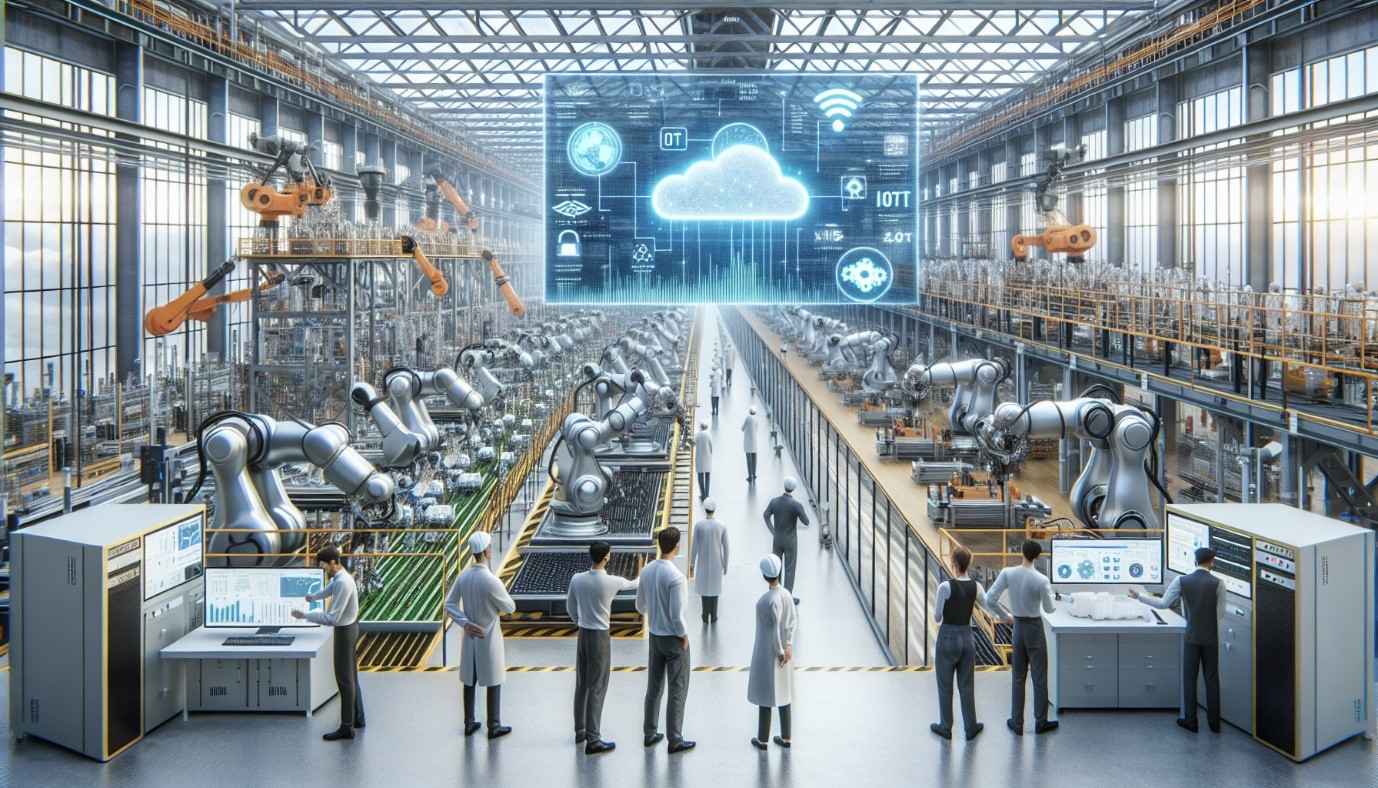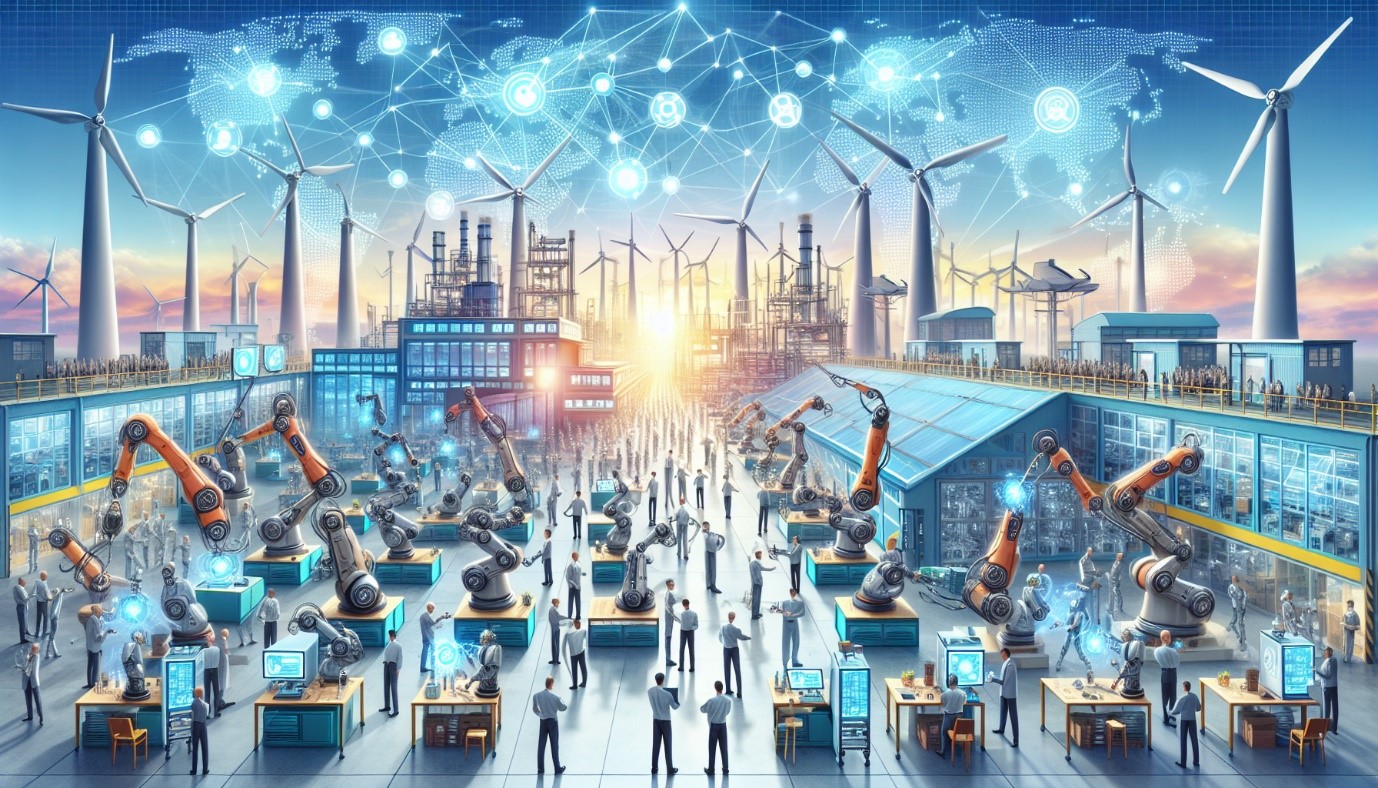
Sustainable Digital Transformation & Future of Industry 4.0
The march of progress has brought us to the future of Industry 4.0, a dynamic industrial revolution driven by digitalization and smart tech. While Industry 4.0 trends are reshaping how we approach manufacturing and business, integrating advanced technologies like AI, IoT, and robotics, these aren't just upgrades; they're revolutionizing every aspect of the industrial world.
One key aspect of this revolution is that digital transformation and Industry 4.0 work hand in hand. The Industry 4.0 digital supply chain transformation is a prime example of this synergy, showcasing how tech can make operations more efficient and responsive. But it's not just about technology; the industry 4.0 market is growing, indicating a larger shift towards smarter industry practices. Yet, as we look at the Industry 4.0 forecast, it's clear that sustainability is the trend that stands out. It's essential for future growth of Industry 4.0 and aligns perfectly with the principles of Industry 4.0. Sustainable practices are becoming a priority for industry 4.0 vendors, highlighting a shift towards more responsible and efficient resource use.
In this episode of Disruption Dialogues Podcast, our speaker, Sanjay Kaul, President-Asia Pacific & Japan, Cisco, and host Aashish Mehra, Chief Research Officer, MarketsandMarkets, explore how Industry 4.0 is shaping up to be more than just a technological leap forward. It's a move towards a smarter, more sustainable industrial future.
The Growth and Future of Industry 4.0
The Industry 4.0 market is burgeoning, with forecasts suggesting significant expansion in the coming years. This growth is fueled by digital transformation and Industry 4.0, where traditional industrial practices are being reshaped by technology. As we delve into this future, it becomes evident that sustainability must be intertwined with our technological advancements. Industry 4.0 is evolving to focus on efficiency, automation, and sustainable practices that can support long-term ecological and economic goals.
"You know the consuming energy, and I think where we need to get to is on that balance sheet analogy, we need to get to the position where semiconductors are driving the sustainability model in the future. So, some areas where the Bing is active clearly as we move away from conventional vehicles' internal combustion engines are producing a lot of pollution. So much CO2 emissions at the point of use as we're moving towards electric traction semiconductors are driving that," says Kaul.
A Futuristic Glimpse into Industry 4.0 Trends and Supply Chain Transformations

Several key influential Industry 4.0 trends are shaping the future of this aspect on a larger scale. Integrating AI and machine learning in industrial processes, for instance, optimizes operations and paves the way for smarter, more sustainable practices. Industry 4.0 vendors play a critical role here, providing the tools and technologies necessary for this transformation. These trends highlight a shift towards more responsible and efficient use of resources, underlining the role of technology in achieving sustainable development.
"We're consuming energy by building their telecom networks, so we need to get to a smart place where semiconductors are central. We need to reach a smart conclusion where semiconductors drive down energy usage and a sustainable existence."? –Kaul adds.
Moreover, a pivotal aspect of Industry 4.0 is transforming the digital supply chain. Businesses leverage Industry 4.0 technologies to create more resilient, transparent, and efficient supply chains. This transformation is not just about improving the bottom line; it's about creating sustainable and adaptable systems to changing global conditions. Digital supply chain transformation is a cornerstone in the journey towards a more sustainable and technologically advanced industrial world.
80% of the Forbes Global 2000 B2B companies rely on MarketsandMarkets to identify growth opportunities in emerging technologies and use cases that will have a positive revenue impact.
- Food Packaging Market Size Set for Strong Growth Through 2030 Amid Rising Demand for Convenience Foods
- Fertilizers Industry Set to Grow at 4.1% CAGR Through 2030
- Leading Automated Guided Vehicle Companies 2024: An In-depth Analysis
- CHARGED UP: SHIFT TO E-MOBILITY AND THE EVOLUTION OF TRANSPORTATION
- Global Automotive Market: Predictions For 2024
The path to integrating Industry 4.0 technologies comes with challenges, from technological adoption barriers to skill gaps!
However, these challenges also present opportunities, particularly in sustainability. As industries overcome these hurdles, they open doors to more innovative, eco-friendly practices that can shape a more sustainable future.
Industry 4.0 is more than a technological revolution; it's a gateway to a sustainable future. As we embrace digital transformation, we must also commit to sustainable practices. The future of Industry 4.0 lies not just in technological advancement but in its ability to drive sustainable development for generations to come.

Frequently Asked Questions
Q: What is the projected market size for Industry 4.0?
A: The Industry 4.0 market is witnessing a significant growth trajectory. It is expected to grow substantially over the next decade, transitioning from its current size of around $600 billion to potentially over $1 trillion by the end of this decade. This growth is driven by advancements in digital transformation and the increasing adoption of Industry 4.0 technologies across various sectors.
Q: How are Industry 4.0 trends influencing the global economy?
A: Industry 4.0 trends are profoundly impacting the global economy. They are introducing new levels of efficiency and automation in manufacturing and other sectors, leading to increased productivity and cost savings. Additionally, these trends are fostering innovation and creating new business models, thereby contributing to economic growth and competitiveness on a global scale.
Q: What role do Industry 4.0 vendors play in this transformation?
A: Industry 4.0 vendors are pivotal in driving the transformation. They provide essential technologies, solutions, and services that enable businesses to implement Industry 4.0 concepts effectively. These vendors are not only technology suppliers but also act as partners in helping businesses navigate the complexities of digital transformation.
Q: How is the digital supply chain being transformed in Industry 4.0?
A: In Industry 4.0, the digital supply chain is transforming significantly, becoming more agile, transparent, and efficient. IoT, AI, and blockchain enable real-time tracking, predictive analytics, and better decision-making. This transformation is crucial for improving supply chain resilience and responsiveness in today's fast-paced market.
Q: What are the challenges in implementing Industry 4.0 technologies?
A: The major challenges in implementing Industry 4.0 technologies include the high cost of investment, the complexity of integrating new technologies with existing systems, and the need for skilled personnel. Data security and privacy concerns also pose challenges for businesses adopting these technologies.
Q: Can you explain the concept of Industry 4.0 digital supply chain transformation?
A: Industry 4.0 digital supply chain transformation refers to integrating digital technologies into all aspects of the supply chain. This transformation includes IoT for tracking goods, AI for demand forecasting, and advanced analytics for supply chain optimization. The goal is to create a more responsive, efficient, and transparent supply chain that can adapt to changing market demands.


